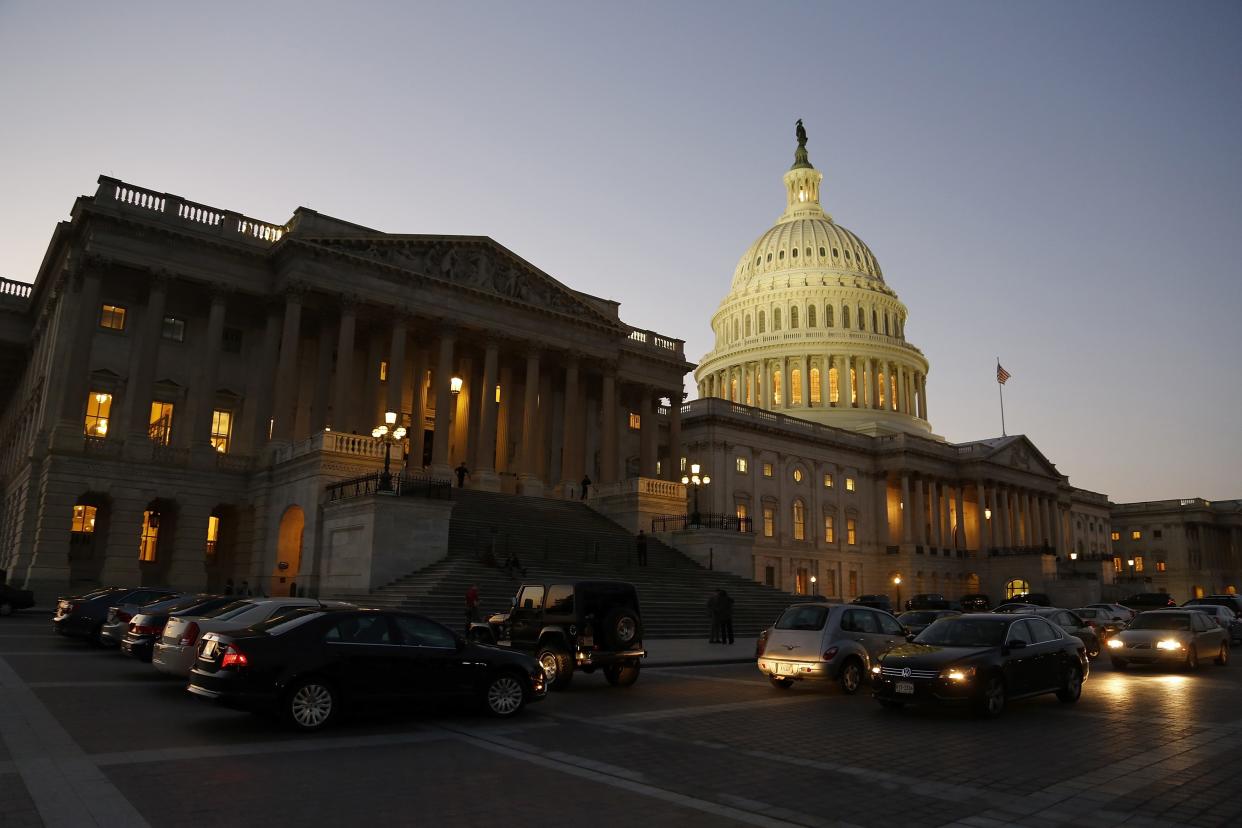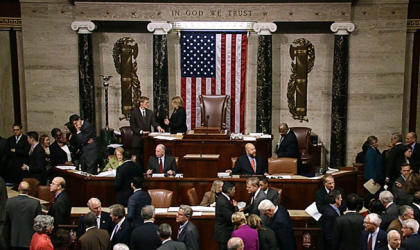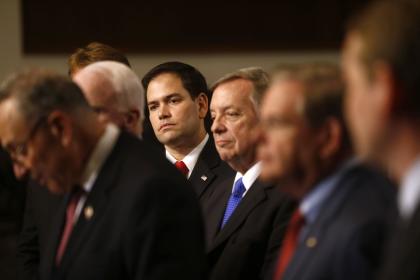Shutdowns and shoutdowns: In 2013, Congress took a gap year

Late at night in Washington, it's not uncommon to see a white light shining atop the dome of the Capitol Building. The unmistakable beam alerts the nation that Congress is still in session, working overtime while the rest of the city sleeps.
The massive light can be seen for miles and is used quite a lot. But what the hell are lawmakers doing in there?
Not much.

50 bills and not counting
In the annals of legislative history, the most memorable thing about 2013 is how profoundly unmemorable it was. There isn't one grand legislative achievement that defined the year — in fact, the most remarkable event in Congress occurred when lawmakers failed to fulfill their most basic responsibilities and shut down the government.
So far this year, President Barack Obama has signed only 50 bills into law. By last Fourth of July — think of it as the congressional calendar's midseason All-Star Break, minus any All-Stars — Congress had sent only 15 bills to the White House that Obama would go on to sign.
These new laws included the Helium Stewardship Act, the Freedom to Fish Act and the Republicans' gimmicky No Budget, No Pay Act. There was also a law "to specify the size of the precious-metal blanks that will be used in the production of the National Baseball Hall of Fame commemorative coins."
The Reducing Flight Delays Act, which notably flew through Congress, to combat airport delays caused by sequestration ensured that lawmakers' own travel schedules between their districts and Washington, D.C., were not interrupted
On the bright side, Republicans and Democrats did come together to extend current interest rates for student loans and open access to American energy sources, but the rest of the year was largely devoted to mendacity.
"Worst Congress Ever"
This pitiful rate of progress makes the previous Congress — which passed 284 laws from 2011 to 2012 and earned the title of "Worst Congress Ever" by Washington intelligentsia on the left and the right — look like a Foxconn iPhone factory of productivity.
There were multiple factors working against congressional productivity this year. While not entirely to blame, the fact that Congress is currently divided between a Republican-majority House and a Democratic-controlled Senate is certainly an inconvenience to Obama's ambitions. In the House, Republican Speaker John Boehner presides over an iron-spined conference full of tea party-backed members who refuse to compromise at almost any cost, making the act of governing difficult.
To make matters worse, it seems the Senate and House have no interest in anything the other chamber is doing. So far this year, the House has passed 149 bills that the Senate has simply ignored. Likewise, the traditionally tortoiselike Senate passed 35 bills that the House has declined to acknowledge.
There were early signs in 2013 that such unproductiveness was coming.
Although Congress rang in the New Year by passing a last-minute emergency bill to avoid the "fiscal cliff," lawmakers failed to reach an agreement that would find an alternative to sequestration, which mandated automatic cuts to domestic and military programs. The sequester, if you will recall to 2011, was established to be so stupid, even Congress wouldn't go through with it. Well.
Big dreams, bigger hurdles
Despite the foreseeable hurdles, Congress and the White House had big dreams for 2013.
There was talk of an immigration bill to end all immigration bills, one that might offer a path to citizenship for millions living illegally in the U.S. There was a landmark gun bill proposed in the wake of the Sandy Hook elementary school shootings in Connecticut that would tighten background checks on firearm purchases.
Obama's advocacy group Organizing for Action began agitating for congressional action on climate change.
Some wondered if this could even be the year that Obama fulfilled his campaign promise and closes the military prison at Guantanamo Bay.
None of those priorities was met.

The push for comprehensive immigration reform began with high hopes, when a bi-partisan Senate coalition that spanned the ideological spectrum vowed to find common ground. The bill brought together staunchly conservative Republican Sen. Marco Rubio of Florida and flamboyantly liberal New York Democratic Sen. Chuck Schumer and saw anti-tax lobbyist Grover Norquist literally stand shoulder-to-shoulder with AFL-CIO President Richard Trumka. The Senate passed its version of an immigration bill 68-32 in June only to be ignored in the House.
Meanwhile, gun-reform advocates thought the horrible string of mass shootings across the nation would prompt at least a slight re-examination of federal gun laws. After the Democratic attempt to curb ownership of assault weapons failed to make it into the final bill, the slimmed-down version, which tightened background checks, failed, too.
The congressional attempt at a farm bill, usually an annual staple, didn't fare any better.
And if you're looking for action on climate change, well, feel free to write your own punch line to that one.
Given the 113th Congress' religious adherence to mediocrity, discord and failure, the federal government shutdown this year probably should have come as little surprise, either.
On Oct. 1, the government shut down for the first time in 17 years after House Republicans refused to fund federal operations unless the Affordable Care Act was defunded or delayed. The government remained shut for more than two weeks and reopened only under threat of catastrophic national default in the run-up to a deadline to raise the federal borrowing limit.
That deal, which cost an estimated $2 billion in federal output, didn't lay a finger on the health care law, leading many Republicans to question the entire point of the exercise.
The shutdown will probably be the biggest memory of this year's congressional calendar — a sad thought to ponder considering that funding the government is quite literally the least Congress can do. The good news is that House Republicans and Senate Democrats appear poised to reach a serviceable — but by no means historic — budget deal that will help avoid any shutdown threat in 2014.
Blessing in disguise
But, of course, quantity doesn't always translate to quality, and the number of bills signed into law isn't the only way to measure good governance. As Will Rogers put it in 1924: "Papers say: 'Congress is deadlocked and can't act.' I think that is the greatest blessing that could befall this country."
Rogers was probably right then, and given the executive branch's difficulty in carrying out laws that Congress does pass, he wouldn't be far off the mark in 2013, either.
When you look at it that way, maybe there's hope for this government yet.



